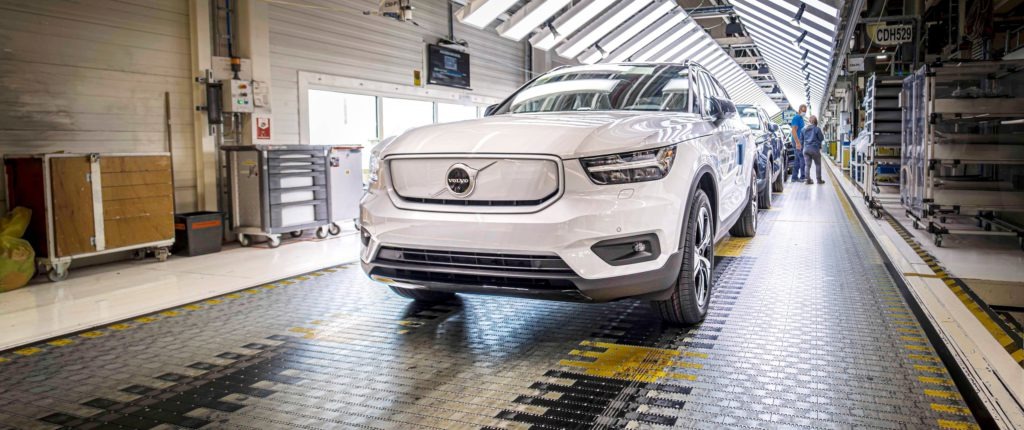Volvo begins BEV production as small SUV teased
08 October 2020

8 October 2020
Volvo’s XC40 Recharge battery-electric vehicle (BEV) has entered production, representing a ′significant’ step towards the company’s ambitions to reduce its carbon footprint per car by 40% come 2025.
By that time, the carmaker is aiming for 50% of its sales to come from BEVs, while the rest will be made up of hybrid models. The XC40 Recharge will lead this progression away from internal combustion engine (ICE) models, and towards a fully-electrified fleet.
The start of customer car production follows a period of preparation in which the company’s Ghent plant has built a limited number of pre-production cars. This process, standard procedure for every new model, aims to optimise the production flow and ensure the quality of every car built. All relevant production staff have also received extensive training on safely building electric cars. Volvo opened a battery-production line at the plant earlier this year.
′Today is a momentous occasion for Volvo Cars and for all employees here in Ghent,’ said Javier Varela, head of global industrial operations and quality. ′As we continue to electrify our line-up, the Ghent plant is a real trailblazer for our global manufacturing network.’
The XC40 Recharge is based on the Compact Modular Architecture (CMA), a platform that Volvo has developed in partnership with the Chinese manufacturer, and parent company, Geely. The first cars are scheduled to be delivered to customers in Europe later this month, with every vehicle scheduled for production until the end of 2020 having already been sold.
New architecture
According to reports, Volvo is also planning to introduce a new model based on Geely’s recently announced sustainable-experience architecture (SEA), which is destined to underpin the Lynk & Co Zero concept and is designed to be used with vehicles in segments A to E.
British magazine Auto Express reports that Volvo is considering using SEA for a smaller SUV, potentially badged as the XC20, with Volvo CEO Håkan Samuelsson confirming to the publication that plans are underway to bring Geely’s platform into its range.
′We will also use SEA,’ Samuelsson said. ′We’ll use it for a smaller car, where I think it’s very practical and smart for us to share that, so we can have a cost structure for a smaller car that’s very competitive. It’s difficult to push the CMA platform, which is a combination platform for EVs and combustion-engine cars, further. So if you want to do a smaller car than XC40, then SEA can do it. We will use it for that.’
Adding a smaller vehicle to its model range will help Volvo appeal to a broader customer base, appealing to those who want a compact model with the practical abilities of an SUV. A smaller model will also likely cost less to purchase, and with a push for 50% of sales to come from BEVs, offering a less-pricey vehicle can only help to drive sales of the technology.
Speaking with the publication, Samuelsson also confirmed that any smaller model the carmaker produces would be an SUV, as these models are popular. He also added that SUVs of the future may look slightly different, as ′off-roading capabilities and ground clearance are not important right now.’